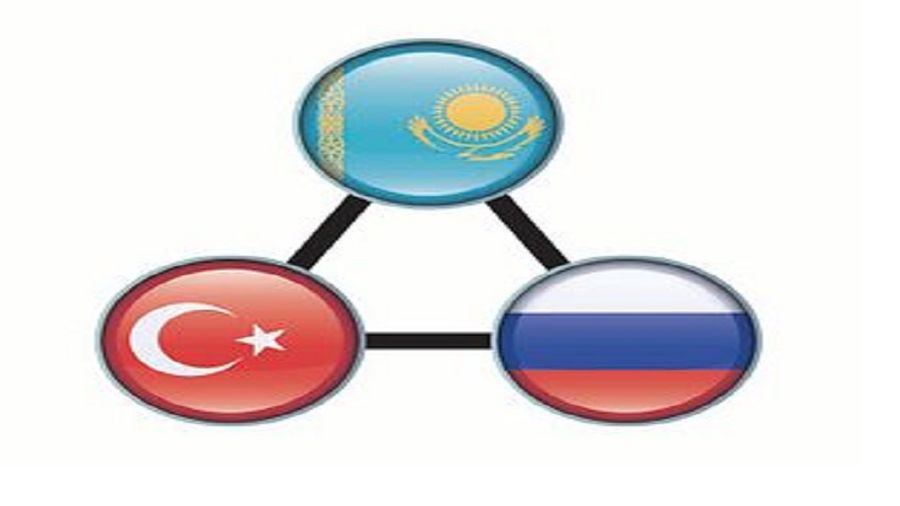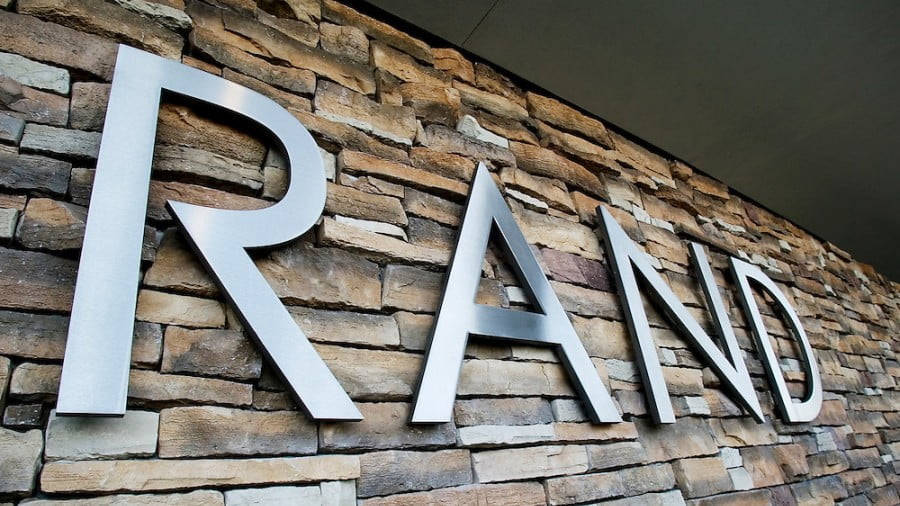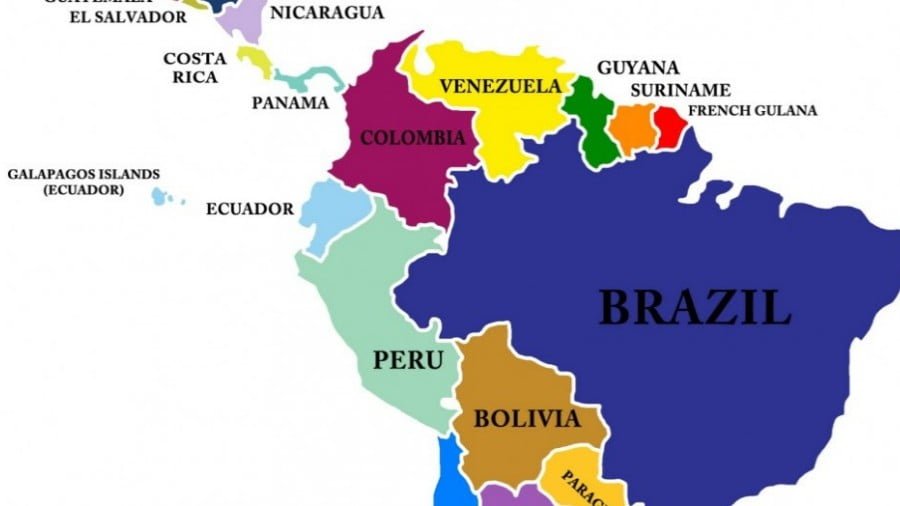Strategic Dynamics of the Russian-Turkish Competition for Influence in Kazakhstan
Somehow or another, Russia needs to ensure that its national language remains attractive in the former Soviet space, particularly within the CSTO states with an emphasis on the Central Asian ones like Kazakhstan and Kyrgyzstan that are moving much closer towards Turkey in the socio-cultural sense due to the Turkic World Vision 2040.
The Civilizational Challenge
Russia and Turkey are competing for influence in Kazakhstan, the one country where their visions of the Russian World and Turkic World most closely overlap due to that state’s significant Russian minority of a little less than 20% of the total population. “Post-Hybrid War Kazakhstan Will Maintain Its Multi-Alignment Policy”, as proven not only by this week’s Organization of Turkic States’ (OTS) Foreign Ministers summit but also by President Tokayev’s appointment of Askar Umarov as his new Minister of Information and Social Development, but this could still present latent challenges for Russian policy.
Askar Umarov’s Curious Ministerial Appointment
Umarov previously led Kazinform, which is one of his country’s top international media outlets, and is a very controversial figure for many Russians. They attribute ultra-nationalist and even arguably at times anti-Russian rhetoric to him from an account that they believe posted on his behalf over the years. Novye Izevestia published a report about this comprised of statements allegedly attributed to Umarov as well as the reaction of several Russian experts to his appointment, which is worthwhile reading for background information into this controversial development.
Whether he truly expressed what’s attributed to him or not, he undoubtedly carries with him a certain stigma nowadays that elicits strong reactions from many Russians. Nevertheless, it remains to be seen whether he’ll express such alleged sentiments in his new position. In any case, it’s worthwhile wondering why President Tokayev appointed him in the first place considering the strong reaction that it provoked from some Russians. He probably did it to signal that he acknowledges the increasingly nationalist sentiments in his society that are suspected of playing a role in the latest violence.
That’s not to imply that President Tokayev shares those views, let alone what’s attributed to Umarov, but just that he’s in a very precarious political position wherein he’s been unexpectedly compelled to balance between his country’s traditionally moderate socio-political forces that are most commonly represented among the older generation and the comparatively more nationalist ones that appeal to growing numbers of the younger generation. With this insight in mind, he might keenly be trying to strike a compromise with such forces in order to temper their nationalist expectations of him.
The Comprehensive Kazakh-Turkish Convergence
Regardless of his exact motivations, which remain unclear at this time though he should still be given the benefit of the doubt for now considering the very difficult post-Hybrid War circumstances in which he’s reconsolidating control of the state, there’s no denying that Kazakhstan is continually moving closer to Turkey. This doesn’t automatically have to be at the prejudice of Russia’s interests or that of its ethnic compatriots in that country, but it’s still worthy of further study in order to better understand this emerging socio-political trend and devise creative means for pragmatically responding to it.
Last November’s meeting of what had up until that time been known as the Turkic Council resulted in this organization rebranding itself as the Organization of Turkic States and adopting the Turkic World Vision 2040. This document amounts to a comprehensive strategic partnership between this Eurasian bloc’s members and carries with it a very heavy emphasis on socio-cultural cooperation. It’s inevitable that Turkish influence will gradually replace Russia’s in all respects, including eventually within the future Kazakhstani elite, unless Moscow robustly engages its southern neighbor in its own way too.
That’s because Kazakhstan has been taking steps towards distancing itself from its Soviet and Imperial pasts. This is most visibly evidenced by its new language policies of switching from the Cyrillic to Latin alphabets for the purpose of signaling inter-Turkic solidarity as well as promoting the teaching of the Kazakh language in schools, including those where Russians make up either the majority of students or a significant plurality. While the Russian state respects its neighbor’s sovereignty and doesn’t meddle, some Russian citizens are becoming very concerned about the future of their co-ethnics’ identity there.
Russian Concerns
To be absolutely clear, Russia and Kazakhstan must remain alert to thwart third parties’ pernicious efforts to manipulate this issue in order to divide and rule them, including to the worst-case end of provoking ethnic clashes between Kazakhstan’s Kazakh majority and Russian minority. Under no circumstances must this be allowed to happen, but Moscow must also become aware that socio-cultural and demographic trends in that country strongly suggest that the soft power appeal of the Russian World will inevitably decline if something isn’t done, especially due to the Turkic World Vision 2040.
If left unchecked, Turkey’s cultivation of a new generation of nationalist elites could with time even erode Russia’s influence within that friendly government, not necessarily towards any adversarial ends but still some that would nevertheless be challenging due to how unprecedented it would be. This was briefly touched upon by the author in his June 2021 article for the prestigious Russian International Affairs Council (RIAC) titled “Towards Increasingly Complex Multipolarity: Scenarios For The Future”. It’s therefore incumbent that Russia challenges this trend in a friendly, gentle, and non-hostile manner.
There’s no chance that the failure of this policy could result in any conventional security threats to the country though since the CSTO countries cannot open foreign military bases on their soil without the approval of all other members. They can, however, stage military exercises such as the annual Steppe Eagle anti-terrorist and peacekeeping ones that Kazakhstan hosts with the US and NATO. Those, however, might not recur either due to the anti-Russian faction of its “deep state’s” suspected role in the latest violence or as part of a comprehensive security deal between the US and Russia.
Although Turkey is a NATO member, Kazakhstan might claim that its military cooperation with it and the other OTS members is done outside of the bloc’s aegis, which could present a workaround of sorts for continuing and even intensifying such ties. Even so, they wouldn’t automatically threaten Russia, though it would be better in that case if Russia was invited to participate in them, whether trilaterally alongside Turkey or multilaterally if they’re carried out under the OTS umbrella. The takeaway is that drills – whether or not they involve Russia – don’t threaten Russia due to Kazakhstan’s CSTO membership.
Moscow’s Dilemma
What might be more worrisome for some observers in Moscow is the future of their ethnic compatriots’ identity in an increasingly nationalized society like the one that Kazakhstan seems slated to inevitably become, both due to existing trends and also concerning its implied intent to this end through the Turkic World Vision 2040 that it agreed to last November. This presents Russia with a dilemma since it mustn’t be perceived as “meddling” in Kazakhstan’s internal affairs, let alone one as sensitive as inter-ethnic relations, but it also can’t sit back and do nothing either.
The solution is to formulate a comprehensive Russian World Vision similar in substance and scope, with a specific focus on a concentrated group of countries such as Moscow’s CSTO allies that are already closer to it than any other set of states are. Sincere sentiments towards Russia vary between them, with Belarusians abeingre the most passionately Russophilic among them while Kyrgyz and Tajiks generally only care about Russia as a destination where they can easily sell their labor for self-interested economic reasons. Armenians and Kazakhs, meanwhile, seem to straddle between those two.
Without formulating a comprehensive Turkic World-like years-long strategy document with realistic goals, Russia risks ceding its soft power influence among its Central Asian CSTO allies – in this case with a particular emphasis on comparatively much more geostrategic Kazakhstan where ethnic Russians account for roughly 20% of the total population – to Turkey the more that time goes on. As was earlier explained, this will lead to the cultivation of an elite that isn’t as sympathetic to Russia as their predecessors but is more aligned with Turkey, which could eventually complicate bilateral ties.
Moreover, there’s always the risk that Kazakhstan’s gradually nationalizing society might inspire radical forces who feel emboldened by recent trends and supposed winks in their direction (e.g. Umarov’s appointment) to carry out acts of intimidation or even violence against that country’s Russian minority under the false belief that they have the state’s tacit backing. Of course, Nur-Sultan – at least under President Tokayev – certainly wouldn’t approve of any such crimes against its own citizens so it also has an interest in keeping these nationalist trends in check in order to avoid an international incident.
Limitations & Opportunities
It’s unclear exactly what the substance of the proposed comprehensive Russian World strategy document should be, but it should generally seek to replicate the spirit of its Turkic counterpart as much as is realistically possible. The main limitation is that the Russian World is based on a comparatively more recent common historical and linguistic heritage as opposed to the much older ones tying Kazakhstan and other Turkic countries like Kyrgyzstan to Turkey. Tajikistan, for those who aren’t aware, isn’t Turkic and has very close civilizational ties with Iran instead.
There must be a robust effort proactively made by Russia in the coming year or two at the absolute latest to compete with the Turkic World strategy in a friendly, gentle, and non-hostile way that ideally works to promote a convergence of these two civilizations through Kazakhstan’s intimately shared ties with both. Without this happening, average Kazakhs and others might perceive the Russian and Turkic World concepts as mutually exclusive, which risks them leaning closer towards the latter due to increasingly nationalist sentiments within their society that could eventually be at Russia’s expense.
Kazakhstan’s (and Kyrgyzstan’s) institutionalized economic ties with Russia through the EAEU can be leveraged to encourage their people to continue learning Russian for economic and other career-related reasons, which might slow the pace of their de facto linguistic “de-Russification” policies. Devoting considerable attention to Russian’s historical use in fostering mutually beneficial inter-ethnic ties across this diverse civilization-state through the centuries into the present day, particularly with respect to helping ethnic Russians and ethnic Turkic people like Tatars maintain excellent ties, is also suggested.
Supplementary Suggestions
The purpose shouldn’t just be to maintain the popularity of the Russian language in those nationalizing societies, but also to encourage those non-ethnic Russians who continue to speak or at least respect that language to also treat their ethnic Russian compatriots with respect. The gradual erosion of that minority’s cultural identity might even prompt greater emigration from the territory that their ancestors inhabited for centuries before there was the newly independent state of Kazakhstan or even constituent republic within the Soviet Union, which could ultimately eliminate their trace from those lands.
Regardless of however that process might unfold, which would ideally be peaceful if it does indeed happen (or rather, continue), the optics could be exploited by ill-intended third parties to provoke inter-ethnic discord within Russia, Kazakhstan, and other countries. Whether it’s a foreign government, “NGO”, or ultra-nationalist group, it might become comparatively easier to politicize this issue simply because of the emotions attached to it by many observers, which could in turn further complicate the situation and risk creating unforeseen challenges in bilateral relations.
Concluding Thoughts
Somehow or another, Russia needs to ensure that its national language remains attractive in the former Soviet space, particularly within the CSTO states with an emphasis on the Central Asian ones like Kazakhstan and Kyrgyzstan that are moving much closer towards Turkey in the socio-cultural sense due to the Turkic World Vision 2040. The failure to reverse its declining appeal will lead to the cultivation of an entirely new generation of elite that don’t hold any special feelings for Russia, which could complicate inter-ethnic relations in Kazakhstan and thus risk leading to unforeseen bilateral problems.
The ideal solution is to boost this language’s appeal in parallel with emphasizing its role in fostering mutually beneficial inter-ethnic relations across the centuries, which can then set the stage for a grand convergence between the Russian World and Turkic World. The emerging Civilizational World Order would be greatly strengthened through that scenario otherwise ill-intended third parties will continually threaten to divide and rule those two organic socio-cultural blocs through Infowars and other Hybrid War provocations. For these reasons, the author’s proposals should be seriously considered.







